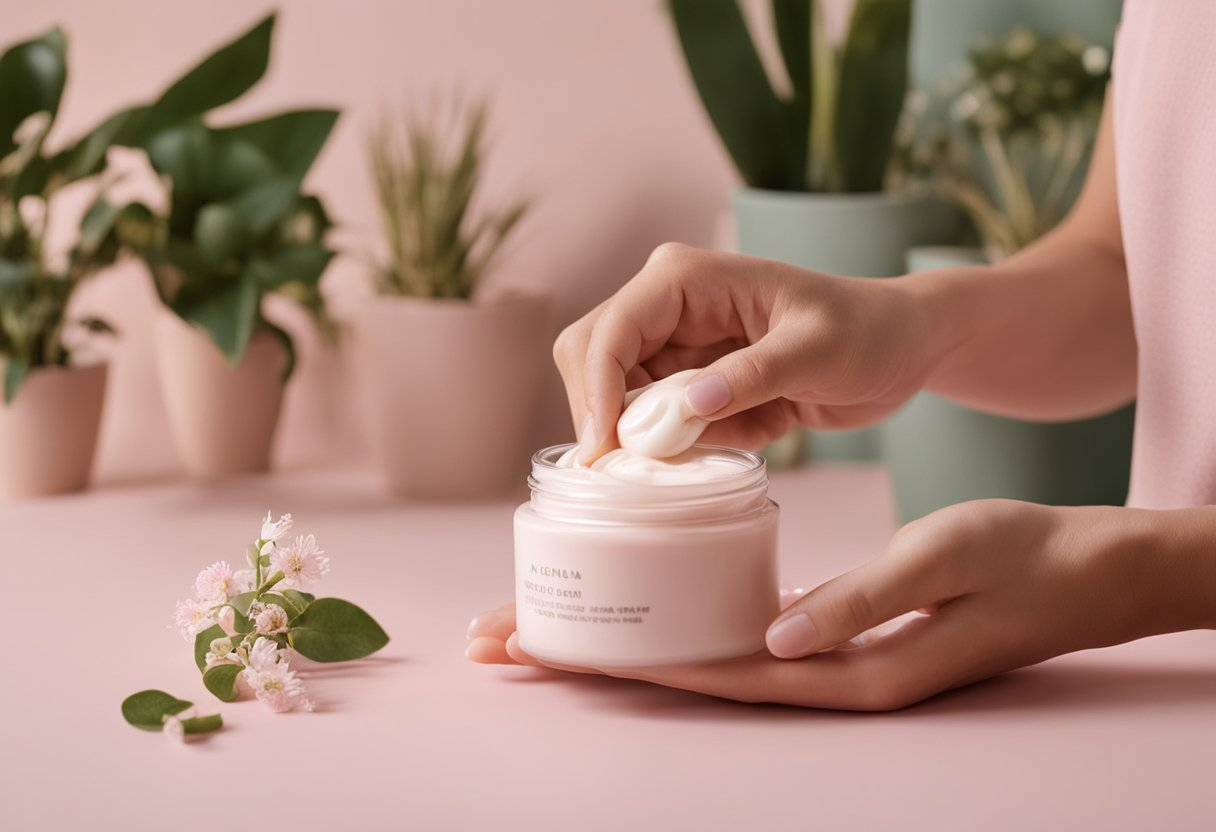Having sensitive skin can be frustrating and uncomfortable. It may react strongly to certain products or environmental factors. Sensitive skin can cause stinging, burning, itching, or redness when exposed to irritants or allergens. This type of skin requires special care and attention to avoid flare-ups.
Many things can trigger sensitive skin reactions. Common culprits include harsh soaps, fragrances, and certain fabrics. Weather changes and stress may also play a role. Understanding your skin’s unique triggers is key to managing sensitivity. With the right approach, you can help calm and protect your sensitive skin.
Key Takeaways
- Gentle skincare routines with mild products can help soothe sensitive skin.
- Identifying and avoiding personal triggers reduces skin reactions.
- Regular moisturizing and sun protection strengthen the skin’s natural barrier.
Understanding Sensitive Skin

Sensitive skin is a common condition that affects many people. It can cause discomfort and react to various triggers. Knowing the signs and causes of sensitive skin helps manage it better.
Defining Sensitive Skin
Sensitive skin is skin that reacts more than normal to external factors. It’s easily irritated and prone to redness, itching, or burning. This type of skin often has a thinner or weaker protective barrier.
People with sensitive skin may have allergies or other skin conditions. These can make their skin more reactive. Sensitive skin isn’t a medical diagnosis, but a term used to describe symptoms.
Common Characteristics and Symptoms
Sensitive skin can show various signs. These may include:
- Redness or flushing
- Itching or burning sensations
- Dryness or flaking
- Bumps or rashes
- Stinging or prickling feelings
These symptoms can appear after using skincare products or exposure to certain elements. They may be mild or severe. Some people have constant symptoms, while others have occasional flare-ups.
Triggers and Environmental Factors
Many things can trigger sensitive skin reactions. Common triggers include:
- Harsh soaps or detergents
- Fragrances in products
- Extreme temperatures
- Sun exposure
- Wind or dry air
- Certain fabrics
Environmental factors like pollution can also affect sensitive skin. Stress and lack of sleep may worsen symptoms. Some people find that certain foods trigger their skin sensitivity.
Identifying personal triggers is key to managing sensitive skin. Keeping a log of reactions and potential causes can help pinpoint problem areas.
Skincare Routine Adjustments

People with sensitive skin need to make careful changes to their skincare routine. These changes focus on product selection, application methods, and how often to use skincare items.
Selecting Appropriate Products
Gentle skincare products are key for sensitive skin. Look for items labeled “hypoallergenic” or “for sensitive skin.” Avoid products with fragrances, alcohol, and harsh chemicals.
Choose a mild, soap-free cleanser. Opt for fragrance-free moisturizers with soothing ingredients like aloe or chamomile. Sunscreen is important, but pick a physical (mineral) sunscreen with zinc oxide or titanium dioxide.
For treatments, start with products containing low concentrations of active ingredients. Patch test new products on a small area of skin before using them on the face.
Application Techniques for Sensitive Skin
Gentle application is crucial. Use clean hands to apply products, not rough washcloths or sponges. Pat products onto the skin instead of rubbing.
When cleansing, use lukewarm water. Hot water can strip the skin’s natural oils and cause irritation. Pat the skin dry with a soft towel after washing. Don’t rub.
Apply products in thin layers. This helps prevent overloading the skin. Wait a few minutes between applying different products to allow each one to absorb.
Frequency of Skincare Processes
People with sensitive skin should limit how often they use certain products. Cleanse the face once or twice a day, not more. Over-cleansing can strip the skin’s protective barrier.
Exfoliate less often than those with normal skin. Once a week or every other week is usually enough. Use very gentle exfoliants.
Apply moisturizer twice daily, morning and night. Sunscreen should be used every day, even when it’s cloudy. Reapply every two hours if spending time outdoors.
Professional facial treatments can be helpful, but limit them to once a month or less. Choose treatments designed for sensitive skin.
Recommended Ingredients and Products

Choosing the right skincare ingredients and products is crucial for sensitive skin. Some ingredients can soothe and protect, while others may cause irritation.
Ingredients That Soothe Sensitive Skin
Chamomile is a top choice for sensitive skin. It naturally detoxifies and fights irritation. Aloe vera is another excellent option. It cools and calms inflamed skin.
Oatmeal is known for its soothing properties . It can help relieve itching and redness. Green tea is rich in antioxidants. It protects the skin from environmental stressors.
Ceramides are helpful for strengthening the skin barrier. They lock in moisture and keep irritants out. Hyaluronic acid is a gentle hydrator. It plumps the skin without causing irritation.
Products to Avoid
People with sensitive skin should steer clear of certain ingredients. Sulfates, fragrances, and alcohol can be very irritating. These are often found in cleansers and toners.
Alpha hydroxy acids (AHAs) and glycolic acid can be too harsh. They may cause redness and stinging. Retinoids, while effective for many, can be too strong for sensitive skin.
Preservatives like parabens may trigger reactions. It’s best to look for products labeled “paraben-free”. Essential oils, despite being natural, can also irritate sensitive skin.
Professional Care and Treatments

People with sensitive skin can benefit from expert care. Dermatologists offer specialized treatments to manage symptoms and improve skin health. Clinical options range from gentle facials to prescription medications.
When to See a Dermatologist
If home remedies don’t work, it’s time to see a skin doctor. Persistent redness, itching, or burning are signs to get help. Severe reactions to products also call for expert advice.
Dermatologists can pinpoint triggers and create custom plans. They may do patch tests to find allergies. Blood tests can reveal underlying health issues that affect skin.
Regular check-ups help track progress and adjust treatments. This is key for people with chronic skin conditions.
Clinical Treatments for Sensitive Skin
Doctors use many methods to treat sensitive skin. Gentle facials can calm irritation and reduce redness. These often include soothing masks and mild exfoliation.
For more serious cases, doctors may prescribe creams. These can include steroids to fight inflammation. Antihistamines help with itching and allergic reactions.
Light therapy is another option. It can reduce redness and improve skin texture. Laser treatments target specific skin issues with precision.
Some patients benefit from chemical peels. Doctors use very mild solutions for sensitive skin. These peels can improve skin tone and texture over time.
Daily Protective Measures
Protecting sensitive skin requires consistent care and attention to environmental factors. Two key areas to focus on are sun protection and shielding practices against other potential irritants.
Sun Protection
Sun protection is crucial for sensitive skin. Use a broad-spectrum sunscreen with at least SPF 30 daily, even on cloudy days. Apply it 15-30 minutes before going outside and reapply every 2 hours or after swimming or sweating.
Choose sunscreens made for sensitive skin. Look for mineral-based options with zinc oxide or titanium dioxide. These are less likely to cause irritation.
Wear protective clothing when outdoors. Wide-brimmed hats, long sleeves, and sunglasses help shield your skin from harmful UV rays.
Avoid peak sun hours between 10 am and 4 pm when UV radiation is strongest. If you must be outside during these times, seek shade whenever possible.
Environmental Shielding Practices
Protect sensitive skin from harsh weather conditions. In cold weather, use a scarf to cover your face and apply a moisturizer to create a barrier against dry air.
Avoid hot showers and baths, as they can strip natural oils from your skin. Use lukewarm water instead and limit bathing time to 10 minutes or less.
Choose gentle, fragrance-free laundry detergents and fabric softeners. Harsh chemicals in these products can irritate sensitive skin.
Use a humidifier in dry environments to add moisture to the air. This helps prevent skin from becoming dehydrated and irritated.
Avoid touching your face throughout the day to reduce the transfer of irritants and bacteria. Always wash your hands before applying skincare products.
Diet and Lifestyle Considerations

Your diet and daily habits can affect your sensitive skin. Eating certain foods and managing stress may help improve your skin’s health and reduce irritation.
Nutritional Support for Skin Health
A balanced diet can boost skin health. Eating fruits and vegetables may help prevent skin damage. Foods rich in omega-3 fatty acids, like salmon and walnuts, can reduce inflammation.
Drinking plenty of water keeps skin hydrated. Green tea has antioxidants that may protect skin cells.
Some people find that cutting out dairy or gluten improves their skin. Pay attention to how your skin reacts to different foods.
Vitamins A, C, and E support skin health. You can get these from colorful fruits and veggies or supplements.
Stress Management Techniques
Stress can make sensitive skin worse. Finding ways to relax may help calm your skin.
Try deep breathing exercises or meditation. Even a few minutes a day can make a difference.
Regular exercise releases feel-good chemicals in your body. This can reduce stress and may improve skin health.
Getting enough sleep is crucial. Aim for 7-9 hours each night to help your skin repair itself.
Hobbies like reading, painting, or gardening can take your mind off stressors. Pick activities you enjoy and make time for them.
Probiotics may help reduce skin sensitivity. You can find these in yogurt or take them as supplements.
Managing Flare-Ups and Irritation

Dealing with sensitive skin flare-ups requires quick action and long-term planning. The right approach can help soothe irritation and prevent future issues.
Immediate Responses to Acute Sensitivity
When skin flares up, act fast. Stop using new products that might be causing trouble. Apply a cool, damp cloth to the affected area for relief.
Use gentle, fragrance-free moisturizing creams to soothe and protect the skin. Look for products with calming ingredients like aloe vera or chamomile.
Avoid hot showers and harsh soaps. Pat skin dry instead of rubbing. Wear soft, loose clothing to reduce friction.
For severe reactions, talk to a doctor. They might suggest topical corticosteroids or other medications to manage symptoms.
Long-Term Strategies to Reduce Episodes
Identify and avoid triggers. Keep a skin diary to track reactions and potential causes. Common culprits include certain foods, weather changes, and stress.
Use hypoallergenic products. Choose gentle cleansers and fragrance-free moisturizers . Test new items on a small skin patch before full use.
Protect skin from the elements. Use sunscreen daily and cover up in harsh weather. Keep skin hydrated by drinking plenty of water.
Manage stress through relaxation techniques. Get enough sleep to help skin repair itself. A healthy diet rich in omega-3 fatty acids may also support skin health.
Regular use of emollients can prevent skin from drying out, which often leads to irritation. Apply them even when skin feels fine.
Skin Resilience Building

Building skin resilience is key for those with sensitive skin. It involves strengthening the skin’s protective barrier and learning to adapt to sensitivity triggers.
Strengthening the Skin’s Barrier
A strong skin barrier is crucial for resilient skin. To boost barrier function, use gentle, fragrance-free cleansers.
Apply a moisturizer with ceramides and fatty acids daily. These ingredients help lock in hydration and protect the skin.
Look for products with niacinamide. It can help reduce inflammation and improve skin elasticity.
Avoid hot showers and harsh exfoliants. These can strip the skin’s natural oils and weaken the barrier.
Use sunscreen every day. UV rays can damage the skin barrier and increase sensitivity.
Adapting to Sensitive Skin
People with sensitive skin should identify their triggers. Common culprits include certain foods, stress, and environmental factors.
Patch test new products before full application. Apply a small amount to the inner arm and wait 24 hours for any reaction.
Choose hypoallergenic and fragrance-free skincare and makeup products. These are less likely to cause irritation.
Protect skin from extreme temperatures. Use a scarf in cold weather and stay in the shade on hot days.
Consider using a humidifier at home. It can help keep skin hydrated and less prone to irritation.
Frequently Asked Questions

Sensitive skin can be tricky to identify and manage. People often have questions about symptoms, causes, and treatments for this common skin condition.
How can one identify if they have sensitive skin on their face?
Sensitive skin often reacts to skincare products with stinging, burning, or itching. Redness and irritation are also common signs.
People with sensitive skin may notice their face feels tight or uncomfortable after using certain products. They might also experience frequent breakouts or dry patches.
What are possible reasons for sudden skin sensitivity?
Sudden skin sensitivity can be triggered by changes in weather, stress, or hormones. New skincare products or harsh ingredients may also cause reactions.
Environmental factors like pollution or allergens can lead to increased skin sensitivity. Medical conditions such as eczema or rosacea may also be responsible.
Which treatments are effective for sensitive facial skin?
Gentle, fragrance-free cleansers and moisturizers are often effective for sensitive skin. Hypoallergenic products can help reduce irritation.
Treatments may include using a mild exfoliant once a week and applying a soothing face mask. Some people find relief with products containing aloe vera or chamomile.
What are the symptoms indicating sensitive skin?
Symptoms of sensitive skin can include redness, itching, and burning sensations. Some people experience dryness, flaking, or rough patches.
Blisters, bumps, or swelling may also occur. Tenderness and a feeling of tightness in the skin are common indicators.
Which products are recommended for people with sensitive skin?
Products labeled hypoallergenic or formulated for sensitive skin are often recommended. Look for items free from fragrances, dyes, and harsh chemicals.
Sunscreens with physical blockers like zinc oxide or titanium dioxide are usually better tolerated. Gentle, non-foaming cleansers and fragrance-free moisturizers are good choices.
What home remedies can be used to treat sensitive skin?
Applying cool compresses can help soothe irritated skin. Oatmeal baths may provide relief for itching and inflammation.
Aloe vera gel can be calming for sensitive skin. Using a humidifier at home can help prevent dryness, which often triggers sensitivity.